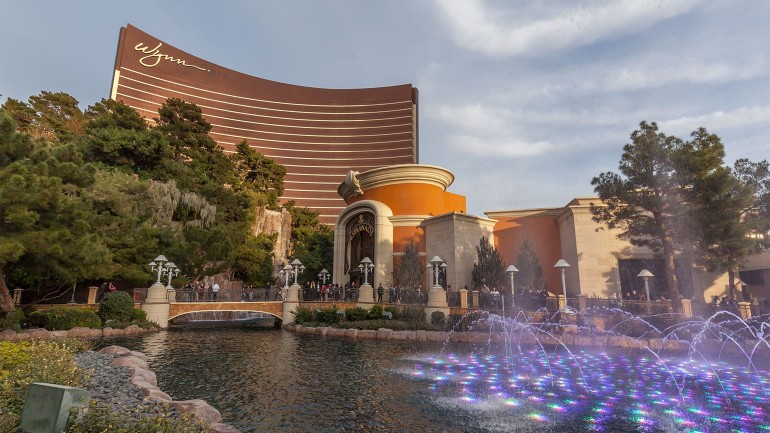Sponsored Listings:
Following a tidal wave of upheaval, Wynn Resorts CEO Matt Maddox kicked off the company’s first-quarter earnings call on April 24 with something of an understatement: “It’s definitely been an eventful three months since we last reported quarterly earnings.”
Indeed, the first 90 days of 2018 were a roller coaster for the luxury integrated resorts company, which saw founder and CEO Steve Wynn resign his post after a Wall Street Journal investigation turned up allegations of a pattern of sexual harassment of current and former employees.
In the 60 days since Wynn’s departure, long-time executive Maddox has stepped into the top spot, and he’s been busy doing damage control, shoring up shareholder confidence and stabilizing the internal culture.
Maddox has swiftly moved to wrap up legal battles and distance the company from its former chief executive. Wynn Resorts settled a long-running lawsuit with Universal Entertainment Corp. in March for $2.4 billion, paving the way for Steve Wynn to sell his entire stake of 12.1 million shares later that month. The company also brought on Galaxy Entertainment Group as an investor, issuing a 4.9% stake in the company for $1 billion.
Jefferies analyst David Katz said the Galaxy investment “sends a supportive message. Galaxy is a well-thought-of entity globally, not just within Macau. Having them as a supportive shareholder sends a positive message.”
Katz added that he viewed Galaxy’s 4.9% stake as a temporary position that could potentially increase the likelihood of winning pending approvals in Nevada and Massachusetts.
In Las Vegas, Maddox reported record quarterly room revenue at the Wynn and stronger bookings year over year.
“What we are feeling and seeing in Las Vegas is continued strength,” he said.
Looking to the future, however, Maddox also announced that he would be reining in Wynn Resorts’ aggressive development plans on the Strip, which include a new convention center facility slated for 2020; the Paradise Park lagoon project, which would transform the Wynn golf course into a watersports playground; and the construction of two resort towers, adding thousands of guestrooms to the company’s Las Vegas inventory.
A 1,500-room hotel has been planned alongside the lagoon, and in December, Wynn purchased the 38-acre Alon site across Las Vegas Boulevard and announced plans for an additional property dubbed Wynn West.
Maddox called the $3 billion budget for the pair of hotel projects unsustainable. “We are taking a hard look at what is sustainable here and what’s going to keep attracting our customer,” he said, suggesting the company will go forward with one but not both of the new integrated resorts.
He also said a review of the meetings project has yielded $35 million in savings and that he’s redirecting the lagoon concept to focus not on the “mass-market theme park” approach but on creating a luxury amenity for resort guests.
“I’m a big believer in the future of Las Vegas,” Maddox said. “We are really fortunate to have a large assembly of prime Las Vegas land, and the importance of appropriately sequencing that development cannot be overstated.”
Katz sees these adjustments as part of the new CEO stepping into his new role and asserting his influence.
“I think that Matt is attempting to put his own signature on the company,” he said. “And by that I mean adding some rigor, some discipline and some focus on the existing projects.”
That process has also included prioritizing a $100 million investment in Wynn Macau, looking into a possible project in Japan and stripping the Wynn name from the company’s $2 billion resort development in Massachusetts.
In response to reports that Wynn might sell that property to MGM Resorts, Maddox said that they still “love the market.” However, he emphasized that if “there could be any contagion from Massachusetts into our $30 billion company in Las Vegas and Macau, we will have to take a hard look at what is best to protect our shareholders and our value.”
The last three months have also involved work on Wynn Resorts’ corporate culture, including implementing parental leave, launching a department on gender equality and meeting with employees to assure them of the company’s stability and strength.
Amid an “onslaught of negativity from the media,” Maddox said he’s been hosting “town halls,” meeting with approximately 15,000 employees and “talking about the future of the company and how bright it is and how we’re not for sale.”
Katz said that distinction might not matter: “I think that there’s two ways that transactions occur: There’s companies that put themselves up for sale, and there’s companies that get bought. I classify this more as the latter. If we sat down and thought about desirability and what entities would want to pay either for the whole company or its assets on an individual basis, I think that math exceeds the opportunities for the company to be valued in its current structure on the earnings it can generate. It’s not going to get the same multiple because it can’t grow in the same ways.”
Nor is the company’s drama quite over, at least not in the short term. After Wynn added three female board members in April, Steve Wynn’s ex-wife, Elaine Wynn, petitioned shareholders to vote out some remaining members of the board who are close to her ex-husband at the annual shareholders meeting on May 16.
“I think we should expect that there might be further changes to the board,” Katz said, adding that for now the company’s positive performance could insulate it from demands for change.
“The numbers are still pretty good,” he said. “If the numbers stop being good, then [investor] activism gains traction.”
Source: travelweekly.com










